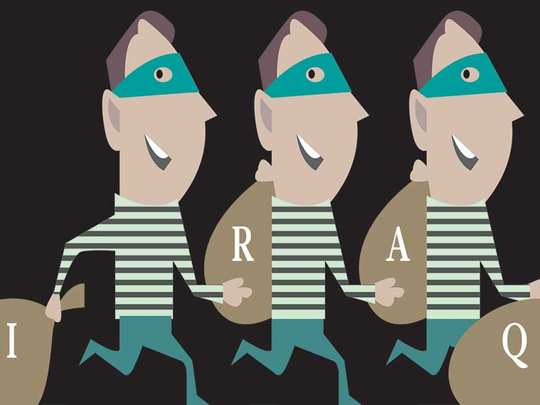
As the world marks the thirteenth anniversary of the Anglo-American invasion and subsequent occupation of Iraq, it is worth repeating what many in the West and the region have said and continue to say; that this was the worst post-Second World War foreign policy mishap whose effects and reverberations continue to rock the world until today and for many years to come.
Volumes have been written on the disastrous decision by George W. Bush and Tony Blair to invade Iraq, topple its regime and enforce a new regional order. Hundreds of indictments have been made of the alleged war crimes, including torture and targeting of civilians with airstrikes, which were committed by the occupiers against the people of Iraq.
People tend to forget that under international law that this war was an illegal one and that those who perpetuated it continue to face potential criminal charges. And five years after the US withdrew from Iraq, that country continues to endure sectarian infighting, a failed political process, religious-inspired militancy and extremism, massive pilfering of resources, foreign intervention and attempts to partition it.
In fact Iraq today is one of the most corrupt and failing states in the world. Its political system is dysfunctional, while ethnic and sectarian conflicts continue to tear up the social and cultural fabrics of one of the most diversified societies in the region. In the north, Iraqi Kurds are close to ceding and declaring independence while the Shiite majority is being pitted by pro-Iranian parties and blocks against the disenfranchised Sunni minority. The latter has provided sanctuary to extreme groups, first Al Qaida and now Daesh (the self-proclaimed Islamic State of Iraq and the Levant), who claim to defend them as they seek to create a new Islamic caliphate.
The war in Iraq has not ended even as the occupiers have left. Aside from the grave humanitarian breaches by corrupt governments in Baghdad, the looting of Iraq is perhaps the biggest of its kind in modern times. Hundreds of billions of dollars went missing from Iraq’s treasury during the notorious reign of former Prime Minister Nouri Al Maliki, with the culprits including high-ranking officials and senior military officers. In 2015 Iraq was ranked 161 out of 168 on Transparency International’s Corruption Perceptions Index.
Recently auditors in the Iraqi parliament found that the defence ministry has spent $150 billion (Dh551 billion) on weapons in the last decade but only a fraction of that has gone to buying weapons and the rest is missing. And Iraq was at the centre of the world’s biggest bribery scandal by little-known oil company, Unaoil, whose leaked documents showed how Western corporations worked with Iraq’s new elite in “a sustained campaign of looting,” according to a joint investigative report by the Huffington Post and Fairfax Media, and paid at least $25 million in bribes. Government officials got large kickbacks and, from 2004 to 2012, Unaoil “influenced a Who’s Who of the country’s oil industry,” from the deputy prime minister to the oil minister and beyond.Corruption has become so rampant that the head of an Iraqi anti-corruption body, Mishan Al Jabouri, admitted to The Guardian in February that “everybody is corrupt, from the top of society to the bottom. Everyone. Including me.”
Narrow interests of powerful players
His admission is in line with a statement by former Iraqi Foreign Minister Hoshyar Zebari who estimated that there were as many as 30,000 ghost soldiers in Iraq’s military and that corrupt officers were pocketing their salaries.
America’s war in Iraq had cost between $1.7 trillion to $2 trillion by the end of 2013. That figure has risen since then and will continue to rise as the US recommits military advisers and special forces in Iraq to assist in the fight against Daesh. These huge amounts of money barely reflect on the everyday life of Iraqis today. Zebari, who also served as finance minister, admitted that the government had spent billions of dollars on infrastructure projects all over the country; the money was spent but the projects never saw the light of day.
The political system that the US has created in Iraq is corrupt to the bone because it services the narrow interests of powerful politicians, religious leaders, pro-Iran militias and crooked military officers. The system collapsed when Daesh took over Mosul, Iraq’s second-largest city, in 2014 and again chased the Iraqi army from Ramadi and Fallujah in Anbar last year.
The political quota system has deepened national divisions, increased sectarian hostilities and created a ruling elite class that has abandoned the people of Iraq — of all components. Secular Iraqi leader Eyad Al Alawi has admitted that the country is now ruled by an organised corruption syndicate. In his view, no Iraqi power can take action on this.
Current Prime Minister Haidar Al Abadi has promised full political reforms. But even if his partners in government allow him to do this, political parties and blocks will not. This was evident last week when he tried to submit a new cabinet of technocrats as demanded by the public and one of the most powerful religious players, Muqtada Al Sadr. His list was rejected and influential blocks resisted doing away with the sectarian quota system. Now the political crisis in Iraq is entering a dangerous chapter as a result.
The pillaging of Iraq continues and corrupt politicians are in no mood to give up their claim to its wealth even as low oil prices threaten to bring the country to the brink of collapse. Whether it is Iranian meddling, Kurdish attempts to cede or the existential threat of Daesh, Iraq is in trouble. But the biggest blame must be borne by the United States and Britain, whose decision to wage an illegal war on Iraq has led to these disastrous realities with no end in sight.
Osama Al Sharif is a journalist and political commentator based in Amman.









